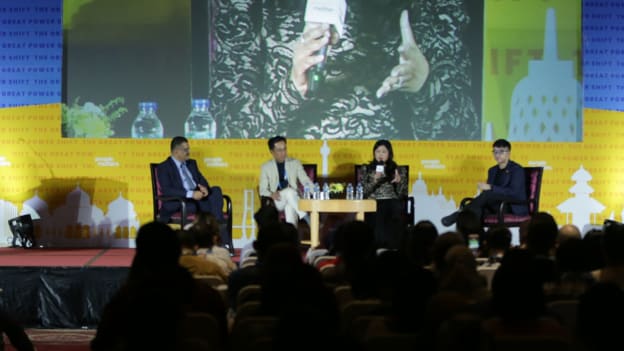C-Suite Panel: Take The Leap From EX To 10X: Become A Valuable Organisation

Employee Experience (EX) is about creating meaningful interactions with employees in the flow of work, and in this power-packed panel moderated by Arun Dhaka, VP Sales -APAC & Japan, Darwinbox, we find answers to burning questions around becoming a people-centric organisation that accelerates talent retention while addressing ongoing challenges from burnout crisis to the employee reshuffle and more.
Irsyad Sahroni, Director & Chief Human Resources Officer, Indosat Ooredoo Hutchison, sums it up, “If we put ourselves in employees’ shoes in a company, the question is how do we want to be treated? And what are the right things to do to achieve that?” Datuk Nora Manaf, Group Chief Human Capital Officer, Maybank, draws parallels between CX and EX. “Because E equals to C, employees are our customers”, she says. Today’s era is about hyper-personalization. “It is about individual touchpoints and how some things need to be replaced. 20 years ago, we were taught moments of truth when building customer experience. As an employee of today, when a person is in need and wants something, what is the experience?” quips Datuk Nora. Wafa Taftazani, Founder & CEO, UpBanx, Co-founder & Chairman VCGamers, outlines employee experience to be the combined factors of experiences that an employee perceives while they are in employment. “I have been an employee for 10 years before I started my career as an entrepreneur, and some defining experiences truly excited me”, he shares.
How to build employee experience?
A few core concepts go into building the EX:
- Create a sense of ownership: Wafa Taftazani shares a snippet from his Google days on how every Google employee was granted stock ownership in the company. “When you own a piece of the company, no matter how small it is, you are not an employee, you are a shareholder and an owner. We treated each other as not just colleagues, but as fellow shareholders”. That defines the entire experience and has been adopted by the vast majority of companies today.
- Foster flexibility: Creating a sense of purpose in people is key. No one wants to be reined in a cubicle, 8 hours-5 days a week. “The era of an implied transactional relationship between employer and employee is over, and anyone trying to resist will be gone”, believes Wafa. Across all his companies, Wafa does not hire employees, he hires team members, visionaries, and fellow shareholders. Giving all employees shareholdership i.e. ESOPs, makes them care about the company and build the companies as fellow founders.
- Build trust: In 2018, the Indosat Ooredoo Hutchison integration posed tremendous challenges. Irsyad believes that to up the engagement, leaders should improve the small things and present the unexpected to people so that they appreciate it more. “How about doing something that people believe is the right thing to do?” he asks. This is what kickstarted the transformation journey, with clear and transparent communication as a tool to merge two different cultures into one. Build empowerment and trust by asking people for their choice and by communicating what the company expects from its people. Focusing on the persons and ensuring they are supported in all ways is the answer.
- Build skills: Maybank launched a future-ready upskilling program for its people in 2018, even before the Covid era. “We were the first company in Indonesia to do so, we invested 40 million in this program and started by bringing everybody to the same level of literacy”, shares Datuk Nora. Giving everybody an equal opportunity, through little things like quizzes, self-assessments etc. enabled people to know where they stood.
- Create required infrastructure: Infrastructure is a core enabler because even when people are capable, organizations cannot realize the business purpose without the basics. Hence, being always agile, and not being married to current HR policies, is important to change. “If someone shows a better way, we are happy to change it tomorrow”, shares Datuk Nora. Infrastructure is about creating an open, supportive, inclusive, and celebratory climate; fun is often the best channel.
- Go global: Having employees and partners across the world helps Wafa better his companies. Different people draw in different perspectives, different technologies, and a need for openness and flexibility. “The moment your company embraces global, national boundaries shatter”, says Wafa. He quotes a tech example, wherein blockchain does not even recognize countries, a transfer is purely between two wallets, and creates a global network.
- Embrace technology: With tech, always start small. For example, Wafa recommends starting simple with blockchain, for example, to maintain the HR database such that employees can access HR data and keep it in their wallets for use. “It opens people to the mindsets required for the upcoming digital culture”, he says. As the leading provider of the Darwinbox Human Capital Management (HCM) software with EX at its heart, Arun believes HR tech is not a be-all end-all but is a critical enabler for workforce engagement and management. “We have a discerning and purpose-oriented workforce today. As the world of work evolves further and becomes digitalized, employees seek experiences that not only meet them where they are but enrich their interaction with work, workplace and workmates. A forward-looking HR platform then is an important ingredient to an organization’s success”.
- Cultivate a stakeholder ecosystem: Action and outcomes speak louder than words, and Datuk Nora shares how people respected better, understood what the organisation wanted, and got in the groove to support it. This was due to creating a conducive stakeholder ecosystem based on connection and trust.
A cultural commitment
In the Indonesian language, the word ‘employee’ means ‘to use’. Whereas in Malaysian, the local word for employee means ‘to create’. – Wafa
This small word-snippet highlights the need for leaders to become more aware. Wafa shares how all his companies were moulded during the pandemic by blockchain and by digitalisation, “We have no knowledge or memories of working together in a shared office, we don’t have something to look back to. This is who we are”. Such a sense of ‘what we do’ needs to percolate across the organisation. For this, getting leaders and owners on board is perhaps the single biggest success factor and can help build the desired employee experience. Leaders should be involved in every single people-related decision, and be open to experimentation. This continued commitment of the C-suite will help reward, retain, and encourage people to bring their best. As Wafa says, “HR leaders must give their creatives the position they deserve in the company, employees build your companies, it is not just we anymore”.

















